

Essential Insights on Support Pets for Mental Health Benefits
by Lena Park
Last updated: July 11, 2025
Verified and Approved by:
Angela Morris,
MSW, LCSW
Fact Checked

Overview
Support pets, particularly emotional support animals (ESAs), play a vital role in enhancing mental health by providing companionship and alleviating feelings of anxiety, depression, and loneliness. Many individuals face significant emotional challenges, and the presence of an ESA can be a comforting solution.
While it’s important to note that ESAs do not possess the same legal rights as service animals, their ability to foster emotional well-being is supported by research that highlights their positive impact on mental health outcomes.
Imagine the warmth and comfort that comes from having a loving companion by your side during difficult times. This connection can truly make a difference in one’s emotional landscape.
If you or someone you know is struggling, consider the supportive solution that an ESA can offer. You are not alone in this journey, and there are resources available to help you find the companionship that can enhance your well-being.
Introduction
In a world where mental health awareness is growing, many individuals facing anxiety, depression, and other emotional challenges find comfort in the companionship of emotional support animals (ESAs). These beloved companions, while not legally recognized like service animals, provide essential emotional support and comfort.
This article explores the key differences between emotional support animals and service animals, shedding light on their legal rights, benefits, and the process of obtaining an ESA letter. It also addresses common misconceptions, the types of animals that can serve as ESAs, and the profound impact these companions can have on mental well-being.
Understanding these distinctions is crucial for anyone considering an emotional support animal, as it empowers them to navigate their rights and responsibilities effectively. Together, we can foster a deeper appreciation for the supportive role these animals play in mental health care, reminding us that we are not alone in our struggles.
Emotional Support Animals vs. Service Animals: Key Differences
Support pets can provide solace and psychological assistance to individuals grappling with mental health challenges. However, it’s important to recognize that they are not equipped to perform specific tasks. In contrast, service animals are specially trained to assist individuals with disabilities and are recognized under the Americans with Disabilities Act (ADA). Only dogs—and in certain instances, miniature horses—qualify as service animals, while emotional support animals (ESAs) can be any kind of creature that offers emotional support.
If you find yourself seeking the comfort of a support pet, Wellness Wag offers a compassionate and efficient way to obtain an ESA letter. We understand that navigating mental health can be overwhelming, which is why we provide interest-free payment plans during checkout, starting as low as $32.25, making it easier for you to manage your costs. By answering a few brief questions about your ESA needs and consulting with a licensed medical professional, you can receive your ESA letter within 24 hours.
This streamlined service not only ensures swift approval but also comes with a money-back guarantee, providing you with peace of mind as you seek emotional assistance. Imagine the comfort of having a loving companion by your side, ready to support you through life’s challenges. Start your ESA registration process with Wellness Wag today, and take the first step towards nurturing your emotional well-being.
Legal Rights and Protections for Emotional Support Animals
Living with mental health challenges can be incredibly difficult, and the companionship of an emotional support animal (ESA) can bring comfort and relief. ESAs are protected under the Fair Housing Act, which allows individuals to reside in no-pet housing without incurring additional fees.
However, it’s important to understand that ESAs do not possess the same public access rights as service animals, which are safeguarded by the Americans with Disabilities Act (ADA). Service dog owners enjoy full public access rights, enabling them to bring their service dogs into various public spaces, such as restaurants and stores. Moreover, service dogs are entitled to housing accommodations, even in areas where pets are generally restricted.
For those with ESAs, holding a valid ESA letter from a certified mental health expert is essential; this letter serves as proof of the need for support pets. Recognizing these distinctions can empower both ESA and service dog owners to navigate their rights and responsibilities with confidence.
Remember, you are not alone in this journey, and there is support available to help you along the way.
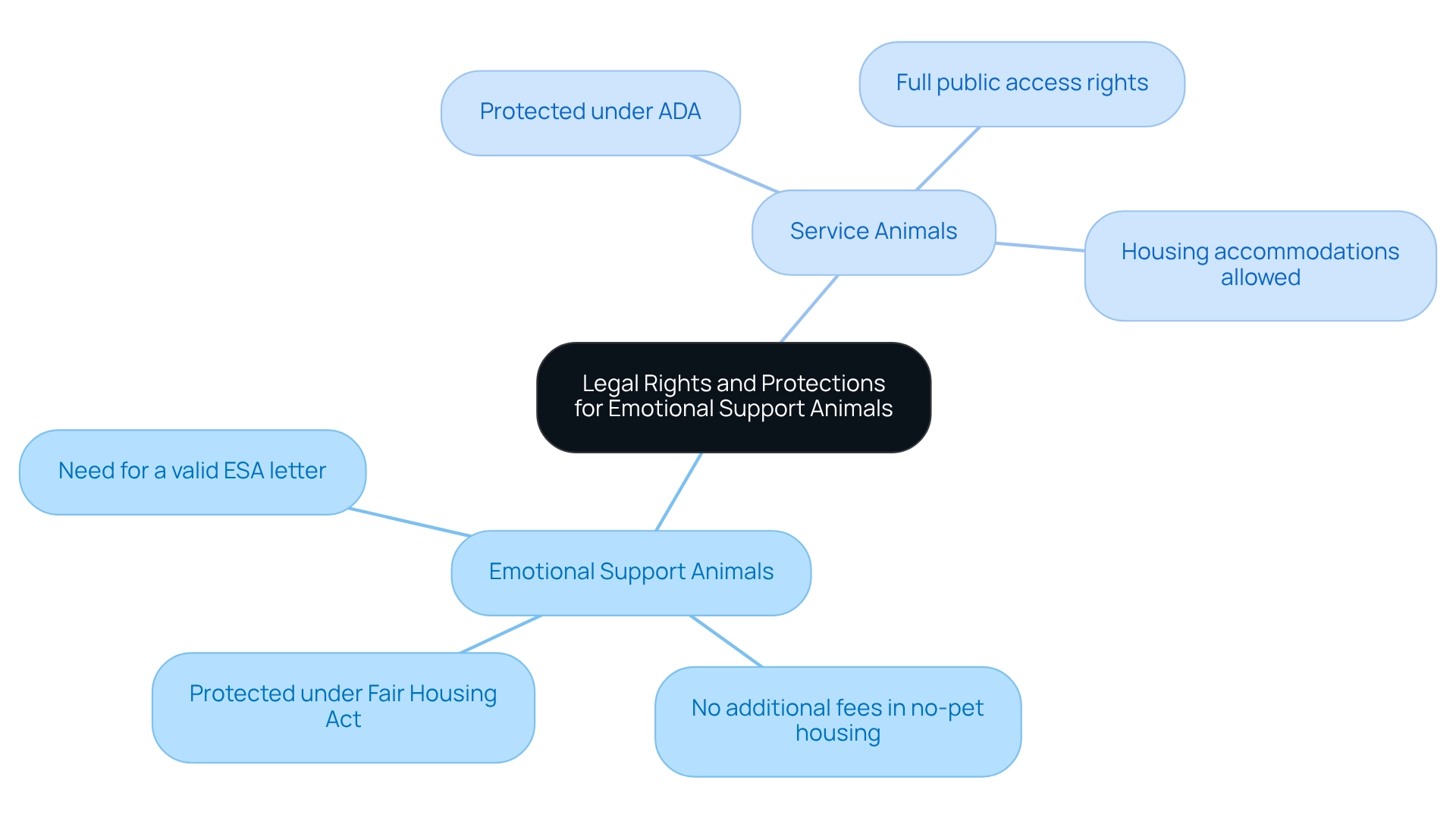
How to Obtain an Emotional Support Animal Letter
Acquiring an ESA letter begins with a brief evaluation at Wellness Wag, where individuals can share their unique circumstances and emotional support needs. This important first step is designed to tailor the services to meet their specific requirements, acknowledging the emotional challenges they may face.
After this, individuals will have the opportunity to consult with a licensed mental health professional who will conduct a thorough evaluation of their mental health needs. If deemed appropriate, the professional will provide an ESA letter, indicating that the individual has a mental health condition and that the animal is intended to offer therapeutic support.
This streamlined process ensures that individuals receive the essential assistance and documentation needed to access the benefits of having an Emotional Support Animal, fostering a sense of connection and understanding in their journey toward emotional well-being.
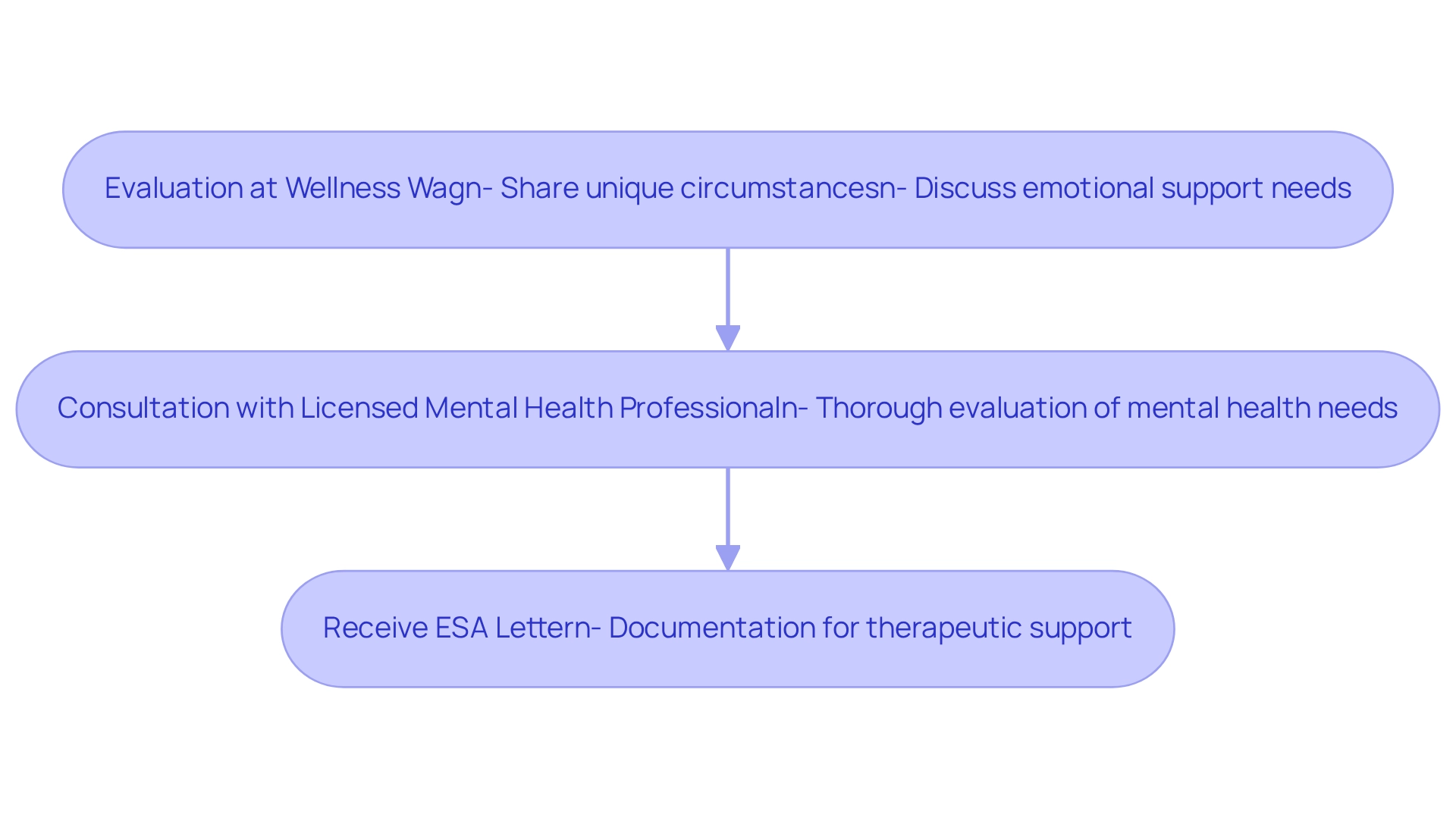
Benefits of Having an Emotional Support Animal
Support pets can significantly ease the burdens of anxiety, depression, and isolation. Their comforting presence not only promotes feelings of safety but also encourages social interaction, which can be so vital during challenging times. Research shows that engaging with support pets can lower cortisol levels and enhance the production of serotonin and oxytocin, ultimately leading to improved mental well-being.
At Wellness Wag, we truly understand the transformative power of therapy companions. This understanding drives us to provide simplified online ESA letters that ensure a seamless experience for our clients. Our dedicated team is committed to delivering authentic ESA letters and comprehensive assistance services, ensuring that you feel supported every step of the way.
With Wellness Wag, you can confidently embrace the many benefits of having support pets, knowing that help is always within reach.
Types of Animals Eligible as Emotional Support Pets
While dogs and cats are often recognized as the primary companions for assistance, it’s heartening to know that a variety of other species can also provide comfort, including rabbits, birds, guinea pigs, and even miniature horses. The essential criterion for an animal to be considered an emotional support animal (ESA) is its ability to offer comfort and companionship to its owner.
Statistics reveal that around 70% of emotional support animals are dogs, with the remaining 30% comprising various other species. This diversity underscores the growing recognition of the therapeutic benefits that support pets can provide. For instance, small animals like rabbits and guinea pigs can be particularly soothing for seniors, delivering companionship without the extensive care requirements of larger pets.
It’s vital to understand the differences between service dogs and comfort animals. While many dog breeds can be trained as service dogs, certain breeds are frequently chosen for their unique traits and characteristics that make them ideal for service work. Breeds such as Labrador Retrievers, Golden Retrievers, German Shepherds, and Poodles are often selected due to their intelligence, trainability, and temperament. In contrast, while ESAs offer psychological comfort and support, they are not trained to perform specific tasks and do not possess the same legal rights and access to public spaces as service dogs under the ADA.
Expert insights stress the importance of understanding an animal’s behavior and emotional stability, especially in travel situations. Dr. Colleen Wilson, a Diplomate of the American College of Veterinary Behaviorists, notes, “The ability to interpret an animal based on its body language and behavior is too often unrecognized, misunderstood, or simply not considered by many pet owners and trainers.” This highlights the necessity for pet owners to be attuned to their companions’ needs, ensuring they provide the appropriate support.
In a case study examining the psychological stability of ESAs during travel, it was found that dogs are often viewed as the most suitable due to their ability to manage stress and elimination functions effectively. Smaller animals may struggle to cope with the psychological demands of travel, potentially leading to health issues. This emphasizes the challenges faced by non-traditional ESAs in travel contexts, where their emotional stability is crucial.
Moreover, unconventional companions like birds have gained popularity for their unique qualities. However, it’s essential for pet owners to communicate openly about their ESAs when entering new environments. Preparing in advance by discussing the needs of both the pet and the owner can facilitate a smoother transition into unfamiliar settings.
As the landscape of psychological assistance animals evolves, understanding the eligibility and benefits of various species remains vital for individuals seeking to embrace pets that offer mental health support.
Common Misconceptions About Emotional Support Animals
Many individuals struggle with misunderstandings about therapy creatures, often assuming they share the same rights as service creatures or that they require registration. This can lead to confusion and frustration. In reality, Emotional Support Animals (ESAs) do not need specialized training and can be any creature that brings comfort to their owner. Unlike trained service dogs, such as Labrador Retrievers or Poodles, ESAs do not have public access rights and lack the same legal protections under the ADA. Understanding this distinction is crucial for appreciating the role and limitations of therapy creatures.
For those grappling with mental health issues, the presence of an ESA can be a profound source of comfort and support. If you’re considering obtaining an ESA letter, Wellness Wag provides a state-specific guide through its online platform, ensuring a smooth and supportive process. Clients have shared their heartfelt testimonials, highlighting the positive impact ESAs have had on their mental well-being. These stories reinforce the invaluable role that ESAs play as supportive companions, offering not just comfort, but also a sense of connection and understanding during tough times.
Required Documentation for Emotional Support Animals
Navigating mental health challenges can be incredibly daunting, and many individuals find themselves in need of support. To qualify for an emotional support animal (ESA), it’s essential to obtain a legitimate ESA letter from a certified mental health professional. This letter must include the professional’s contact information, license number, and a statement affirming your need for the animal as part of your treatment plan. At Wellness Wag, we understand how overwhelming this process can be, and we are here to help.
We believe that everyone deserves the comfort and companionship that an ESA can provide. That’s why we streamline the process by offering a personalized assessment tailored to your unique needs. After completing our brief evaluation, we will connect you with a certified physician for a comprehensive assessment. This ensures you receive the necessary documentation to support your mental health journey.
You are not alone in this; we are committed to walking alongside you every step of the way. Together, we can help you find the support you need to enhance your well-being and embrace the love of an emotional support animal.
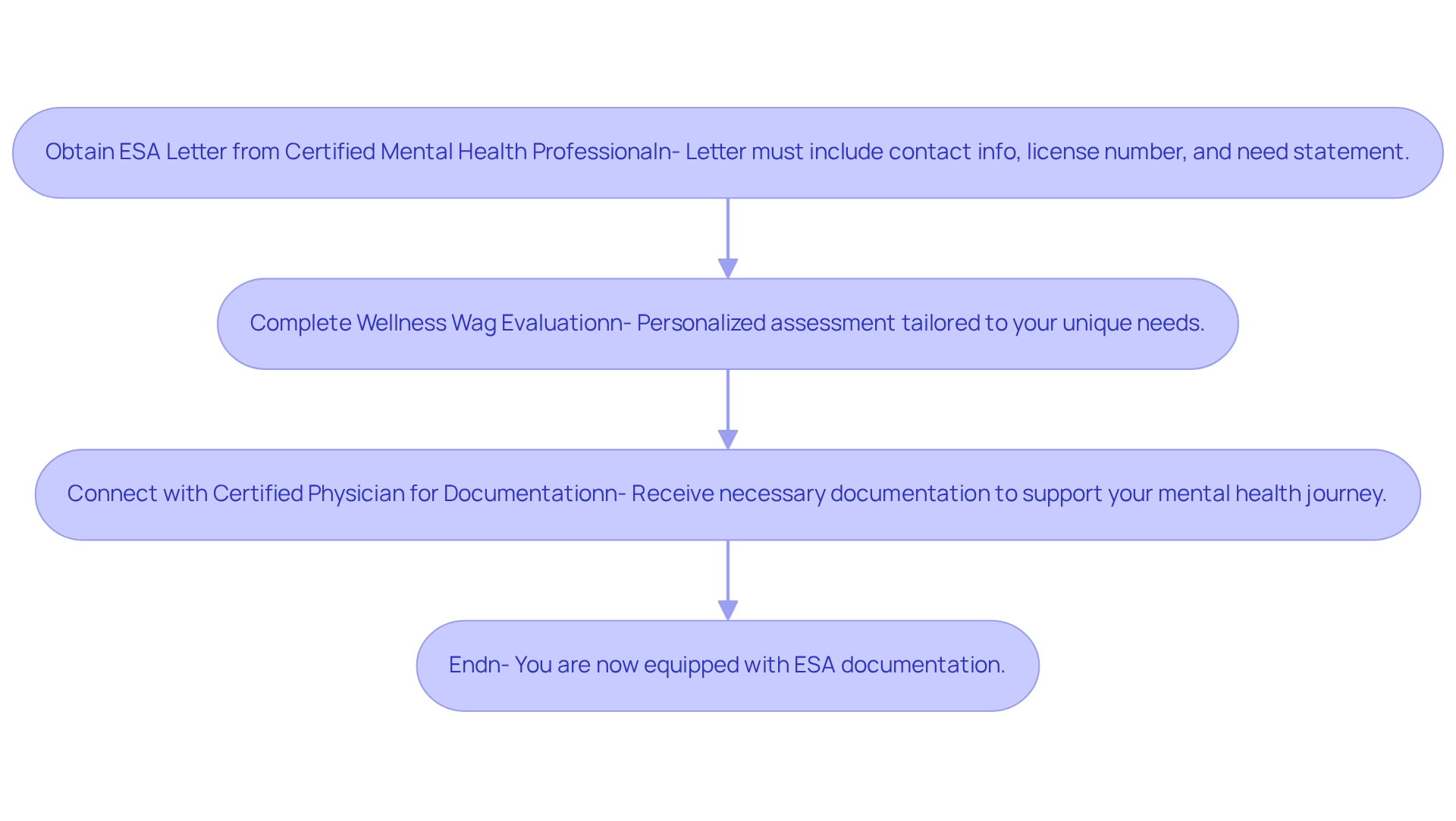
Impact of Emotional Support Animals on Mental Health
Studies consistently show that support pets play a vital role in alleviating symptoms associated with anxiety, depression, and PTSD. Their companionship not only uplifts mood but also mitigates feelings of loneliness, fostering a sense of purpose among individuals. While specific statistics on ESA owners’ mental health improvements were not provided, ongoing research continues to illuminate the positive effects of ESAs on mental health conditions.
For instance, a recent study revealed that therapy dogs, like those in the Dogs on Call program, significantly reduce loneliness in the people they visit. This underscores the profound impact support pets have on emotional well-being. This aligns with findings from the VCU Center, which encourages community members to engage with therapy dogs, demonstrating how such interactions can enhance the welfare of both the dogs and the volunteers involved.
Moreover, the U.S. Department of Transportation’s recent regulations, which classify ESAs as pets rather than service animals, have raised concerns about potential discrimination against those who rely on ESAs for mental health support. As Prairie Conlon, a leading expert on Emotional Support Animals, poignantly stated, “This proposed rule would be eliminating the ability of all clinicians and doctors to utilize [ESA] treatment for their clients with mental health concerns, when the goal should actually be to eliminate the fraudulent [ESA] sites that are enabling scammers.” This shift highlights the importance of valid ESA documentation, empowering individuals to advocate for their rights under housing and travel regulations.
At Wellness Wag, we deeply appreciate the transformative benefits of therapy animals that support pets, as reflected in the experiences of our clients. Many have shared how our streamlined process for obtaining ESA letters has profoundly impacted their lives. For example, James B. noted, “The approval process for my ESA was easy and hassle-free,” while Linda S. expressed that “Wellness Wag made getting an Emotional Support Animal a breeze.” These testimonials underscore our commitment to providing authentic ESA letters and comprehensive support services, ensuring that individuals can access the comfort and psychological relief that ESAs offer.
In conclusion, the evidence underscores the essential role that therapy pets play in enhancing mental health outcomes, particularly for at-risk groups. It emphasizes the necessity of supporting pets through accessible and legitimate ESA services, reminding us that help is available for those who seek it.
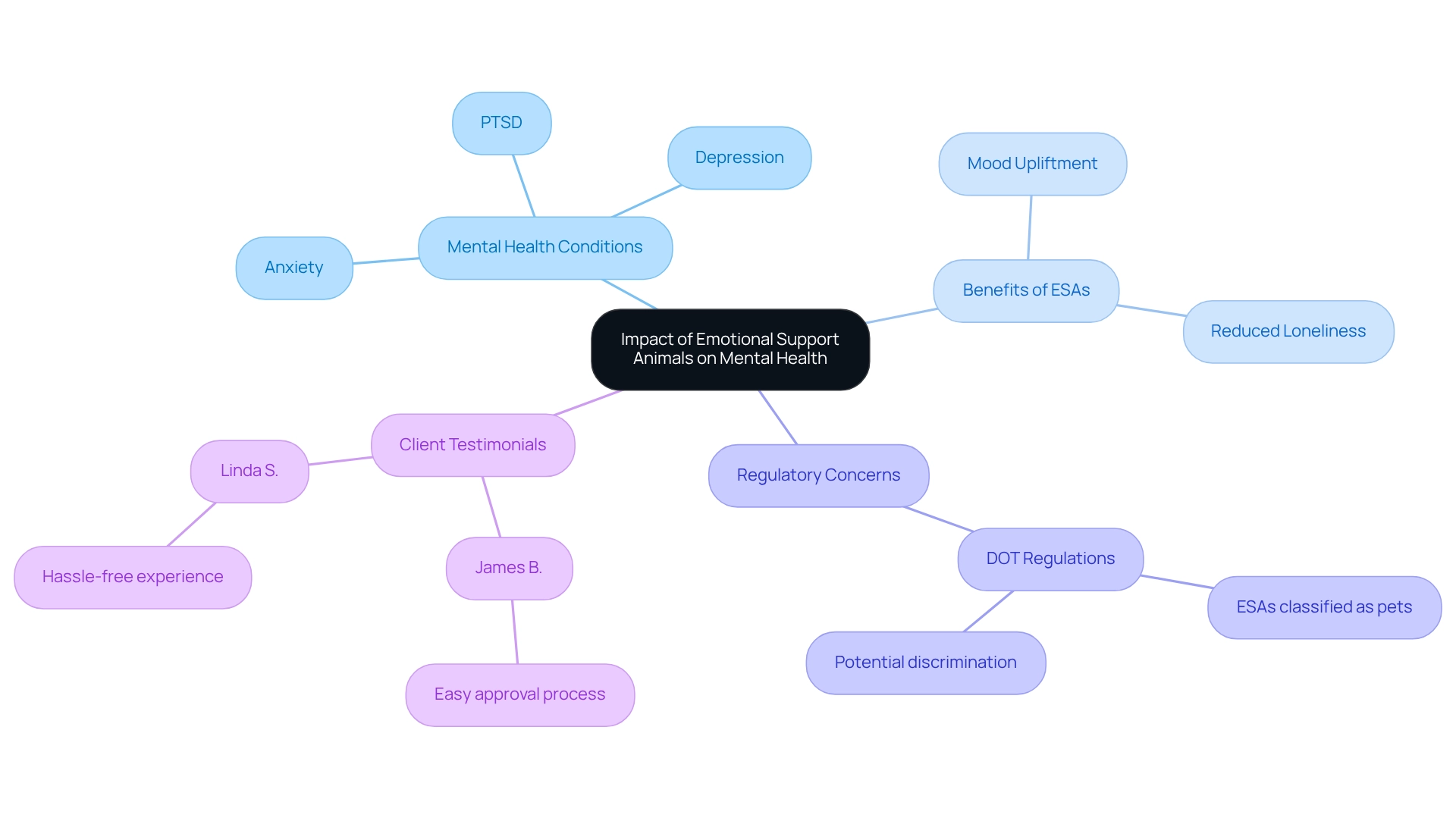
Travel Privileges for Emotional Support Animals
As we approach 2025, many airlines, including Air Canada, are making changes to their policies regarding comfort animals, often viewing emotional support animals (ESAs) as regular pets rather than service animals. This shift can be disheartening for ESA owners, as it may lead to unexpected pet fees and the need to comply with specific airline regulations. It’s important to recognize the emotional toll this can take on individuals who rely on their ESAs for support.
While service dogs are granted full public access rights under the Americans with Disabilities Act (ADA), ESAs do not share the same legal protections. For those traveling with psychiatric service dogs, having the right documentation is essential—this includes a U.S. DOT form and a recommendation letter to facilitate a smooth check-in experience. Understanding these requirements can help ease some of the anxiety associated with travel.
Travelers should also keep in mind that pet fees can differ based on the type of flight. This variability can add to the stress of planning a trip. Therefore, it’s always wise to verify your airline’s policies before flying. This proactive step can help you feel more prepared and avoid any unexpected costs, allowing you to focus on the journey ahead.
In this challenging landscape, remember that support is available. Connecting with professionals who can provide ESA letters can be a vital step in ensuring that your emotional needs are met while traveling. You are not alone in navigating these changes, and there are resources to help you along the way.
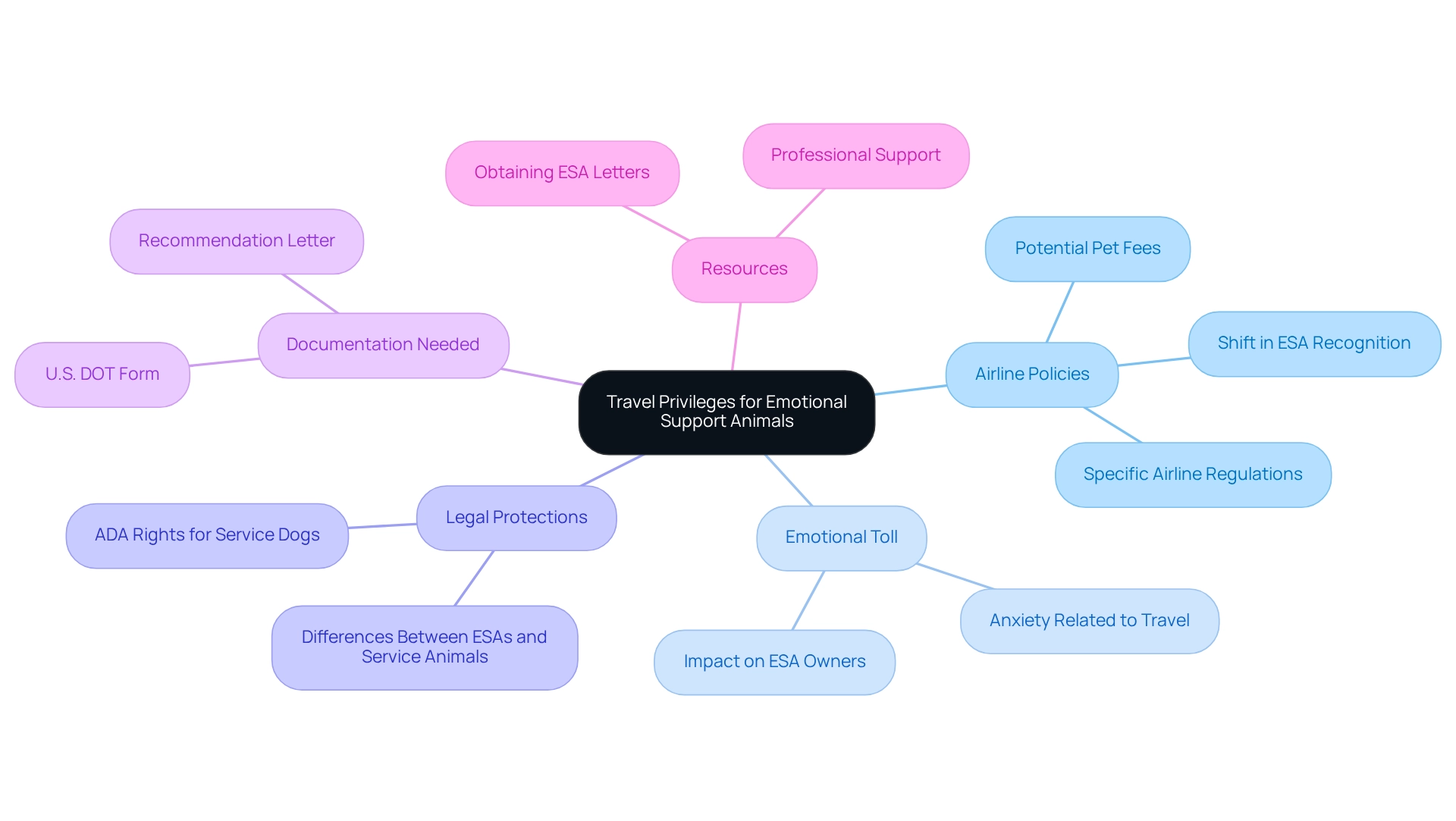
Consulting Healthcare Professionals for Emotional Support Animal Needs
Consulting with a licensed mental health professional is vital for individuals contemplating an Emotional Support Animal (ESA). These compassionate professionals assess mental health needs and determine if an ESA is the right fit, guiding clients through the process of obtaining a valid ESA letter with care and understanding. At Wellness Wag, we offer a rapid evaluation tailored to your psychological requirements. After submitting the necessary forms, clients are connected with a licensed medical doctor for a personalized consultation and thorough evaluation to assess eligibility for an ESA. This streamlined process ensures that individuals receive the support they need efficiently.
Statistics reveal that over 60% of individuals seek professional advice before acquiring an ESA, emphasizing the importance of informed decision-making. This figure underscores the necessity for individuals to engage with mental health professionals who can provide tailored guidance and support.
When discussing ESA requirements with a mental health expert, it is helpful to share specific psychological challenges and how an animal could provide assistance. This open dialogue fosters a collaborative approach to care, ensuring that the ESA aligns with therapeutic goals. Mental health professionals are encouraged to recommend continuing education opportunities to stay informed about ESA laws and ethical practices, enhancing their ability to guide clients effectively.
Real-world examples illustrate the positive impact of professional guidance in navigating ESA needs. Clinicians are advised to consider various factors when writing ESA letters, including the clinical assessment of the need for an ESA and the potential impacts on the therapeutic relationship. As James B. shared in his testimonial, “Thanks to Wellness Wag, I received approval for my ESA quickly and without any difficulties. Their staff is friendly and caring.” This highlights the significance of understanding rights related to Emotional Support Animals, Pet Therapy Animals, and Service/Assistance Animals. By prioritizing these consultations, individuals can better advocate for their rights under the Fair Housing Act and Air Carrier Access Act, ensuring that their emotional support needs are met with the necessary documentation.
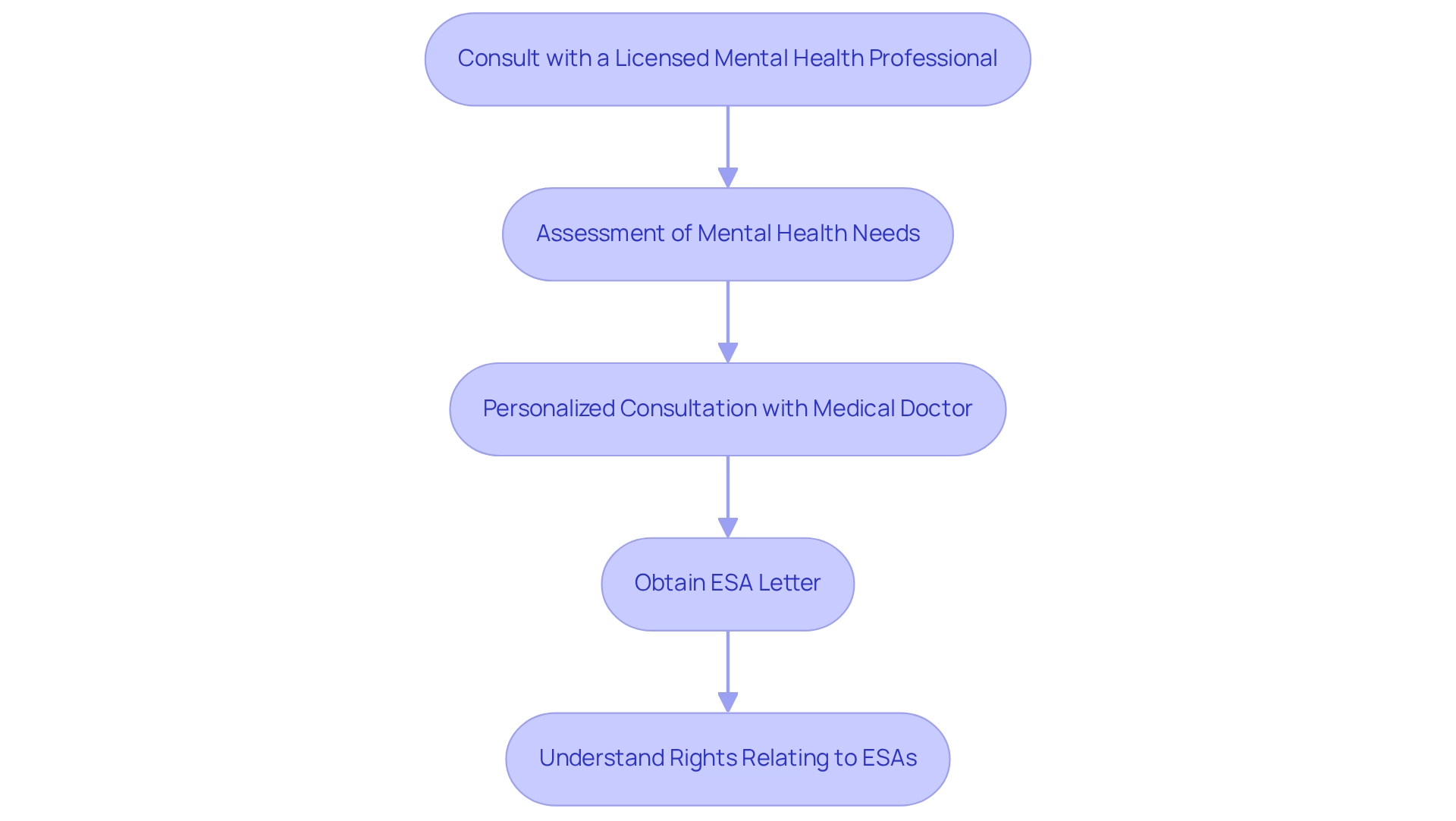
Conclusion
Emotional support animals (ESAs) are invaluable companions, playing a crucial role in enhancing mental health and well-being. They provide comfort and companionship to those navigating emotional challenges. Unlike service animals, which are trained for specific tasks, ESAs offer emotional support without the same legal protections. Understanding these distinctions is essential for individuals seeking to effectively navigate their rights and responsibilities.
Obtaining an ESA letter can be a simple yet empowering process. By consulting with a licensed mental health professional, individuals can receive documentation that validates their need for an ESA. This letter not only affirms their emotional support but also opens doors to housing accommodations and other benefits under the Fair Housing Act. Wellness Wag ensures that clients receive timely and legitimate ESA letters, enabling them to embrace the comfort and love these animals provide.
As misconceptions about ESAs persist, it is vital to clarify their rights and limitations. While ESAs can be any type of animal that offers emotional support, they lack the public access rights afforded to service animals. Recent changes in airline policies have categorized ESAs as regular pets, making it important for travelers to stay informed about regulations to avoid unexpected fees and complications.
In conclusion, emotional support animals significantly enhance mental health, offering solace and companionship. By understanding the benefits and legal aspects of having an ESA, individuals can advocate for their emotional well-being and appreciate the transformative impact these animals can have in their lives. Remember, the journey toward mental wellness is often shared, and with the right support, no one has to face their challenges alone.
Frequently Asked Questions
What is the difference between emotional support animals (ESAs) and service animals?
Emotional support animals provide comfort and psychological assistance but are not trained for specific tasks. In contrast, service animals, specifically dogs and sometimes miniature horses, are trained to assist individuals with disabilities and are recognized under the Americans with Disabilities Act (ADA).
What rights do emotional support animals have?
Emotional support animals are protected under the Fair Housing Act, allowing individuals to live in no-pet housing without incurring additional fees. However, they do not have the same public access rights as service animals, which can enter various public spaces.
What is required to obtain an ESA letter?
To obtain an ESA letter, individuals must undergo a brief evaluation at Wellness Wag, share their emotional support needs, and consult with a licensed mental health professional who will assess their mental health and provide the letter if appropriate.
How long does it take to receive an ESA letter from Wellness Wag?
Individuals can receive their ESA letter within 24 hours after completing the necessary evaluations and consultations.
Are there any payment options available for obtaining an ESA letter?
Yes, Wellness Wag offers interest-free payment plans starting as low as $32.25 to help manage costs when obtaining an ESA letter.
What guarantees does Wellness Wag provide for their ESA letter service?
Wellness Wag provides a money-back guarantee, ensuring peace of mind for individuals seeking emotional assistance through their service.
How can individuals start the process of obtaining an ESA letter?
Individuals can start the ESA registration process with Wellness Wag by answering a few brief questions about their needs and consulting with a licensed medical professional.
Certify Your Emotional Support Animal Today

Why You Can Rely on Us?
At Wellness Wag, we believe your pet deserves care rooted in both science and compassion. Each article is carefully researched, written in clear language for pet owners, and then reviewed by qualified professionals to ensure the information is evidence-based, current, and practical for real-life care. Our goal is to help you feel confident in making informed decisions about your pet’s health and well-being.
Reviewed by
Angela Morris, MSW, LCSW
Angela is a licensed clinical social worker with 20 years of experience in patient advocacy and community mental health. She has assisted numerous clients with ESA evaluations and brings a deep understanding of disability accommodations, ensuring that all information is accurate, supportive, and practical.

Written by :
Lena Park
Last Updated :
July 11, 2025












